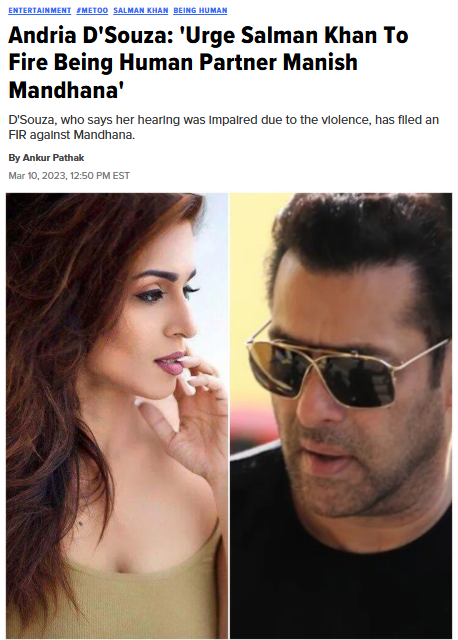Mumbai-based model and actor Andria D’Souza has made shocking allegations against Manish Mandhana, the CEO of Being Human Clothing, accusing him of physically assaulting her and causing permanent hearing impairment. This case has sparked widespread public and media interest, not only because of the severity of the allegations but also due to Mandhana’s high-profile association with Bollywood superstar Salman Khan and the philanthropic brand Being Human. This article delves into the disturbing accusations, the legal implications, the media fallout, and the broader questions it raises about accountability within high-powered organizations.
The Allegations: Assault, Trauma, and Permanent Damage
In early March, 33-year-old Andria D’Souza stepped forward with serious accusations against Manish Mandhana. The abuse, she claims, began in August 2017 and continued for several months until November of that year. What began as a professional relationship during a 2015 Being Human store launch in Dubai deteriorated into a toxic personal interaction, eventually leading to violence.
According to D’Souza, one of the most brutal incidents occurred when Mandhana allegedly struck her so hard that she collapsed and hit her head against a table. The result was a traumatic brain injury that has left her with vertigo, persistent dizziness, and permanent hearing loss in one ear. Medical evaluations at Mumbai’s Jaslok Hospital confirmed her injuries, providing crucial documentation in support of her claims.
The aftermath of the abuse affected D’Souza’s personal and professional life. She was forced to withdraw from high-profile hosting jobs and media commitments. The trauma drove her into depression, rendering her bedridden for extended periods. She also developed chronic health issues, including hypertension and nerve disorders, requiring long-term medication and care.

The FIR and Legal Strategy
On March 4, 2025, Andria D’Souza filed a First Information Report (FIR) at the Gamdevi police station in Mumbai under Section 325 of the Indian Penal Code, which pertains to voluntarily causing grievous hurt. The police, under the supervision of PI Rakesh Jadhav, are currently investigating the case.
D’Souza’s legal counsel, advocate Falguni Brahmbhatt, has presented medical records and other forms of evidence to substantiate the complaint. According to Brahmbhatt, the case is not just a fight against physical abuse but also a battle against powerful social structures. She claims that Mandhana, due to his ties with Salman Khan and his prominent role in Being Human, wields substantial influence.
“He believes his powerful connections will protect him,” said Brahmbhatt in a statement to the media. “But justice doesn’t see power, it sees truth.”
Brahmbhatt has also extended support to other alleged victims of Mandhana, stating that D’Souza’s courage might inspire others to come forward. “This is bigger than one case. We want to break the silence that often surrounds such abuse, especially when committed by those in positions of power,” she said.
A Direct Appeal to Salman Khan
Perhaps the most dramatic element of this case is D’Souza’s direct appeal to Bollywood superstar Salman Khan. As the face of Being Human, Khan has significant influence over the brand’s image and leadership. D’Souza questioned how a man like Mandhana, whom she describes as a “serial offender,” could be entrusted with running a charitable organization that aims to promote compassion and humanitarian values.
“Being Human is supposed to represent kindness and decency,” D’Souza stated in an interview. “How can someone who misuses that platform to hurt women be allowed to lead it?”
She also revealed that she had attempted to reach out to Mandhana’s wife via email in November 2017, detailing the abuse, but received no reply. This, she says, only added to her feelings of helplessness and isolation. For a year after the alleged incidents, she remained silent due to financial instability, fear of public judgment, and deteriorating mental health.

The Power and Reach of Manish Mandhana
Manish Mandhana is not an ordinary businessman. As the CEO of Mandhana Industries, a company with ties to major global fashion brands like Tommy Hilfiger, Pepe Jeans, and Allen Solly, his influence extends far beyond India. The 2011 licensing agreement between Mandhana Industries and Being Human Clothing allows the company to design, manufacture, and distribute all merchandise under the Being Human label—a deal valid until 2028.
Mandhana’s visibility in the industry and his perceived closeness with Salman Khan add layers of complexity to the situation. Being Human is often seen as an extension of Khan’s image—a brand that donates portions of its profits to education and healthcare initiatives. The involvement of such a high-profile figure raises uncomfortable questions: Can a charity continue to promote values of goodwill while sheltering leadership accused of violence?
Legal System vs. Influence: The Indian Dilemma
D’Souza’s case echoes a broader problem in India: the influence of power and celebrity on justice. Time and again, women have struggled to get their voices heard when the accused are men with wealth and powerful networks. The MeToo movement brought some progress, but backlash and silencing are still common.
Advocate Brahmbhatt argues that this is not just a criminal complaint, but a cultural reckoning. “This case is about more than one woman’s suffering. It’s about ensuring that power doesn’t become a shield for wrongdoing,” she said.
Public Outcry and Media Coverage
Since the filing of the FIR, media coverage of the case has grown. Prominent news platforms such as Mid-day and HuffPost India have reported on the incident, amplifying public interest. Social media has played a crucial role, with hashtags like #JusticeForAndria and #AccountabilityForMandhana trending across platforms.
However, both Mandhana and Salman Khan have remained silent. This silence has led to speculation and frustration among supporters of D’Souza, who see the lack of response as an attempt to quietly manage the crisis.
Meanwhile, Being Human has continued its operations without any formal acknowledgment of the issue. Critics argue that this silence undermines the brand’s credibility and its professed commitment to social welfare.
D’Souza’s Resolve and the Road Ahead
Despite the odds, Andria D’Souza remains determined to pursue justice. Her courage in coming forward, backed by medical evidence and legal support, has opened a much-needed dialogue on abuse within professional and elite social circles.
“I want to ensure no one else suffers like I did,” she says. Her statement resonates as a rallying cry for those who have experienced similar trauma but remain voiceless due to fear or social stigma.
Her legal team continues to gather testimonies and evidence, hopeful that the investigation will move swiftly and impartially. They urge other victims to step forward, assuring them of support and confidentiality.
Implications for Being Human and Celebrity-Driven Philanthropy
The scandal has placed Being Human under intense scrutiny. A brand built on the ideals of compassion and altruism must now confront its internal contradictions. Can a charitable organization truly fulfill its mission if it allows alleged abusers to hold leadership roles?
For Salman Khan, the stakes are equally high. As the face of Being Human, he is expected to uphold the organization’s integrity. A public statement or decisive action could reinforce the brand’s credibility—or its absence could severely damage its reputation.
This situation also serves as a cautionary tale for celebrity-backed philanthropy. When stars lend their names to causes, the public assumes a level of moral endorsement. Any scandal within the organization reflects back on the celebrity, sometimes unfairly, but always significantly.
Conclusion
Andria D’Souza’s allegations against Manish Mandhana are more than a personal grievance—they are an indictment of the systemic abuse and unchecked power within certain elite circles. Her courage in stepping forward, supported by legal counsel and medical evidence, challenges not only her alleged abuser but also the culture of silence that often protects the powerful.
The outcome of this case may set a precedent for how similar allegations are handled in the future, especially when they involve high-profile individuals and brands. It underscores the urgent need for transparency, accountability, and structural change within organizations that claim to operate under the banner of humanity and justice.







